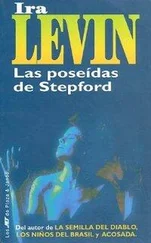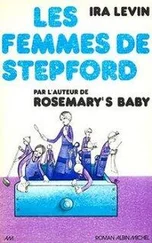She pretended still to be limp and docile; ate her meals and looked at magazines and pumped out her milk.
It was Leah Fountain who was there when everything was right. She came in after Helen Wees had gone out with the milk and said, “Hi, Rosemary! I’ve been letting the other girls have the fun of visiting with you, but now I’m going to take a turn. You’re in a regular movie theater here! Is there anything good on tonight?”
Nobody else was in the apartment. Guy had gone to meet Allan and have some contracts explained to him.
They watched a Fred Astaire-Ginger Rogers picture, and during a break Leah went into the kitchen and brought back two cups of coffee. “I’m a little hungry too,” Rosemary said when Leah had put the cups on the night table. “Would you mind very much fixing me a cheese sandwich?”
“Of course I wouldn’t mind, dear,” Leah said. “How do you like it, with lettuce and mayonnaise?”
She went out again and Rosemary got the fold of magazine cover from her tissue box. There were eleven pills in it now. She slid them all into Leah’s cup and stirred the coffee with her own spoon, which she then wiped off with a tissue. She picked up her own coffee, but it shook so much that she had to put it down again.
She was sitting and sipping calmly though when Leah came in with the sandwich. “Thanks, Leah,” she said, “that looks great. The coffee’s a little bitter; I guess it was sitting too long.”
“Shall I make fresh?” Leah asked.
“No, it’s not that bad,” Rosemary said.
Leah sat down beside the bed, took her cup, and stirred it and tasted. “Mm,” she said and wrinkled her nose; she nodded, agreeing with Rosemary.
“It’s drinkable though,” Rosemary said.
They watched the movie, and after two more breaks Leah’s head drooped and snapped up sharply. She put down her cup and saucer, the cup two-thirds empty. Rosemary ate the last piece of her sandwich and watched Fred Astaire and two other people dancing on turntables in a glossy unreal fun house.
During the next section of the movie Leah fell asleep.
“Leah?” Rosemary said.
The elderly woman sat snoring, her chin to her chest, her hands palmupward in her lap. Her lavender-tinted hair, a wig, had slipped forward; sparse white hairs stuck out at the back of her neck.
Rosemary got out of bed, slid her feet into slippers, and put on the blue-andwhite quilted housecoat she had bought for the hospital. Going quietly out of the bedroom, she closed the door almost all the way and went to the front door of the apartment and quietly chained and bolted it.
She then went into the kitchen and, from her knife rack, took the longest sharpest knife-a nearly new carving knife with a curved and pointed steel blade and a heavy bone handle with a brass butt. Holding it point-down at her side, she left the kitchen and went down the hallway to the linen-closet door.
As soon as she opened it she knew she was right. The shelves looked neat and orderly enough, but the contents of two of them had been interchanged; the bath towels and hand towels were where the winter blankets ought to have been and vice versa.
She laid the knife on the bathroom threshold and took everything out of the closet except what was on the fixed top shelf. She put towels and linens on the floor, and large and small boxes, and then lifted out the four gingham-covered shelves she had decorated and placed there a thousand thousand years ago.
The back of the closet, below the top shelf, was a single large white-painted panel framed with narrow white molding. Standing close and leaning aside for better light, Rosemary saw that where the panel and the molding met, the paint was broken in a continuous line. She pressed at one side of the panel and then at the other; pressed harder, and it swung inward on scraping hinges. Within was darkness; another closet, with a wire hanger glinting on the floor and one bright spot of light, a keyhole. Pushing the panel all the way open, Rosemary stepped into the second closet and ducked down. Through the keyhole she saw, at a distance of about twenty feet, a small curio cabinet that stood at a jog in the hallway of Minnie and Roman’s apartment.
She tried the door. It opened.
She closed it and backed out through her own closet and got the knife; then went in and through again, looked out again through the keyhole, and opened the door just the least bit.
Then opened it wide, holding the knife shoulder-high, point forward.
The hallway was empty, but there were distant voices from the living room. The bathroom was on her right, its door open, dark. Minnie and Roman’s bedroom was on the left, with a bedside lamp burning. There was no crib, no baby.
She went cautiously down the hallway. A door on the right was locked; another, on the left, was a linen closet.
Over the curio cabinet hung a small but vivid oil painting of a church in flames. Before, there had been only a clean space and a hook; now there was this shocking painting. St. Patrick’s, it looked like, with yellow and orange flames bursting from its windows and soaring through its gutted roof.
Where had she seen it? A church burning . . .
In the dream. The one where they had carried her through the linen closet. Guy and somebody else. “You’ve got her too high.” To a ballroom where a church was burning. Where that church was burning.
But how could it be?
Had she really been carried through the closet, seen the painting as they carried her past it?
Find Andy. Find Andy. Find Andy.
Knife high, she followed the jog to the left and the right. Other doors were locked. There was another painting; nude men and women dancing in a circle. Ahead were the foyer and the front door, the archway on the right to the living room. The voices were louder. “Not if he’s still waiting for a plane, he isn’t!” Mr. Fountain said, and there was laughter and then hushing.
In the dream ballroom Jackie Kennedy had spoken kindly to her and gone away, and then all of them had been there, the whole coven, naked and singing in a circle around her. Had it been a real thing that had really happened? Roman in a black robe had drawn designs on her. Dr. Sapirstein had held a cup of red paint for him. Red paint? Blood?
“Oh hell now, Hayato,” Minnie said, “you’re just making fun of me! ‘Pulling my leg’ is what we say over here.”
Minnie? Back from Europe? And Roman too? But only yesterday there had been a card from Dubrovnik saying they were staying on!
Had they ever really been away?
She was at the archway now, could see the bookshelves and file cabinets and bridge tables laden with newspapers and stacked envelopes. The coven was at the other end, laughing, talking softly. Ice cubes clinked.
She bettered her grip on the knife and moved a step forward. She stopped, staring.
Across the room, in the one large window bay, stood a black bassinet. Black and only black it was; skirted with black taffeta, hooded and flounced with black organza. A silver ornament turned on a black ribbon pinned to its black hood.
Dead? But no, even as she feared it, the stiff organza trembled, the silver ornament quivered.
He was in there. In that monstrous perverted witches’ bassinet.
The silver ornament was a crucifix hanging upside down, with the black ribbon wound and knotted around Jesus’ ankles.
The thought of her baby lying helpless amid sacrilege and horror brought tears to Rosemary’s eyes, and suddenly a longing dragged at her to do nothing but collapse and weep, to surrender completely before such elaborate and unspeakable evil. She withstood it though; she shut her eyes tight to stop the tears, said a quick Hail Mary, and drew together all her resolve and all her hatred too; hatred of Minnie, Roman, Guy, Dr. Sapirstein-of all of them who had conspired to steal Andy away from her and make their loathsome uses of him. She wiped her hands on her housecoat, threw back her hair, found a fresh grip on the knife’s thick handle, and stepped out where they could every one of them see her and know she had come.
Читать дальше











